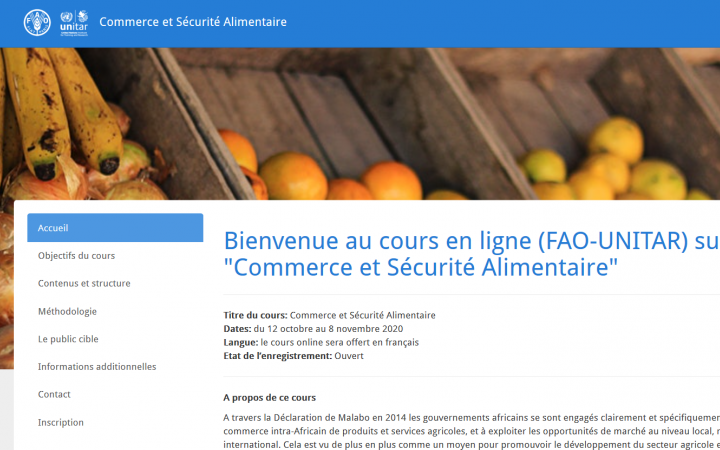18 June 2020, Geneva, Switzerland - Strong demand for the online course on Trade and Food Security has prompted UNITAR and the Food and Agriculture Organization of the United Nations (FAO) to relaunch the course in French for Sub-Saharan African countries. It was initially offered for Sub-Saharan African countries in French in 2018 and in English in 2019.
During the past 2 years, requests for the course has continued to grow. The increasing need for trade experts to support trade related development agenda in the region has posed a major challenge. In most cases, national and regional institutions do not have the technical capacity and resources to map out national, sub-regional and regional level trade priorities and constraints; to empirically assess the implications of their multiple memberships on trade and food security; to formulate appropriate mitigation policies and strategies; or to negotiate trade agreements that boost gains from trade and specialization.
This course therefore seeks to strengthen capacities in Sub-Saharan Africa, to develop and implement evidence-based trade policies, and to formulate and negotiate trade agreements, taking into consideration both their needs for economic growth and structural transformation, as well as their food security concerns.
This course is designed to assist representatives from government and related authorities, who are directly involved in the formulation and implementation of agricultural policies and programmes in Sub-Saharan Africa. These includes officials from Ministries of Agriculture, Livestock, Fisheries; Ministries of Trade, Commerce, Industry; Ministries of Finance, Economy; and Food Safety, representatives of the private sector and researchers.
In the preparation of this course, FAO draws from its extensive experience with providing guidance and technical advice to its member countries on the topic of trade and food security, agricultural trade policy and multilateral trade negotiations, as well as its normative work on the SPS issues.
By the end of the course, participants will be able to assess the challenges and opportunities posed by greater openness to trade for food security, describe different types of trade policy measures and considerations for trade policy design and implementation as well as discussing the key global policy and regulatory frameworks governing trade, food security, including the WTO Agreement on Agriculture and Agenda 2030.
Register Now, Limited Slots are Available
This course will be organized in three units and conducted in French over a period of four weeks. This course will be delivered online via UNITAR’s e-learning platform and will take place from 12 October to 8 November 2020.
Limited slots are available and will be subject to a selection process conducted by FAO and UNITAR, taking into account in particular, the geographical distribution and gender balance.
Priority will be given to policy makers and practitioners who impact agricultural trade through regional, national or sector-level actions, and professionals who are able to convey information and provide technical advice to their constituencies (trainers, professional staff of producer organizations, extension officers etc.)
A certificate of completion will be issued to participants who successfully complete all course-related assignments and assessments.
For more information and online registration, please visit UNITAR’s website at: http://tfsn-fr.unitar.org/2020. Registration deadline is 21 September 2020. Please register early.
Over the past seven years, UNITAR’s collaboration with FAO has continued to grow with over a dozen of agriculture and trade-related courses developed and delivered for the benefit of over 1,000 beneficiaries globally with a large part coming from Africa and Central Asia.
About FAO
FAO is a specialized agency of the United Nations that leads international efforts to defeat hunger. The goal is to achieve food security for all and make sure that people have regular access to enough high-quality food to lead active and healthy lives. With over 194-member states, FAO works in over 130 countries worldwide. For more information, visit www.fao.org


